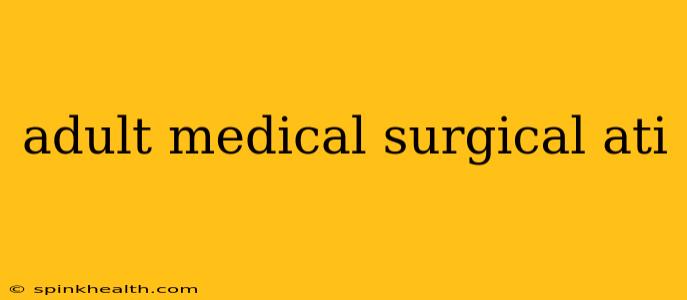Navigating the Complex World of Adult Medical-Surgical Nursing: A Journey Through the ATI
The world of adult medical-surgical nursing is a vast and dynamic landscape. It’s a field demanding not only extensive knowledge but also a keen ability to adapt, problem-solve, and provide compassionate care in often challenging situations. For students preparing for this demanding career, the ATI (Assessment Technologies Institute) exams represent a significant hurdle. This journey through the intricacies of adult medical-surgical nursing, as seen through the lens of ATI preparation, will explore key concepts and address frequently asked questions.
What is the ATI Medical-Surgical Nursing Exam?
The ATI Medical-Surgical Nursing exam is a comprehensive assessment designed to evaluate a nursing student's understanding of adult medical-surgical concepts. It covers a wide range of topics, from basic anatomy and physiology to complex disease processes and treatment modalities. The exam is often a significant component of a nursing program's curriculum, and a strong performance can be crucial for successful progression. Think of it as a rigorous trial run before facing the real-world challenges of the profession.
What topics are covered in the ATI Med-Surg Exam?
The breadth of the ATI Med-Surg exam can feel overwhelming at first. However, understanding the core subject areas helps to break it down into manageable pieces. Typical topics include:
-
Fundamentals of Nursing Care: This foundational area encompasses basic nursing skills, such as medication administration, wound care, infection control, and patient safety. Mastering these fundamentals is crucial for success in all aspects of medical-surgical nursing.
-
Cardiovascular System: This covers a vast spectrum, from understanding normal cardiac physiology to recognizing and managing conditions like heart failure, arrhythmias, and myocardial infarction. The ATI exam will test your knowledge of diagnostic tests, medications, and nursing interventions.
-
Respiratory System: Similar to the cardiovascular section, this section tests your understanding of respiratory physiology, common respiratory illnesses (pneumonia, COPD, asthma), and appropriate nursing actions.
-
Gastrointestinal System: Here, you’ll be tested on the anatomy and physiology of the digestive system, along with common disorders such as peptic ulcers, inflammatory bowel disease, and liver failure. Knowledge of diagnostic procedures and nutritional considerations is also key.
-
Endocrine System: This section dives into the complexities of hormone regulation and common endocrine disorders, including diabetes mellitus, thyroid disorders, and adrenal insufficiency.
-
Renal System: Understanding renal physiology, common renal disorders (kidney failure, urinary tract infections), and dialysis procedures are all essential components.
-
Neurological System: This area covers the anatomy and physiology of the nervous system and neurological disorders, such as stroke, traumatic brain injury, and seizures. You will need to understand neurological assessments and appropriate interventions.
-
Musculoskeletal System: This encompasses musculoskeletal anatomy, common injuries (fractures, sprains), and conditions such as osteoarthritis and osteoporosis.
-
Oncology: This vital section delves into the complexities of cancer, including types of cancer, treatment modalities (chemotherapy, radiation), and supportive care for cancer patients.
-
Integumentary System: This focuses on skin health and common skin disorders, including pressure ulcers, wound management, and skin infections.
-
Patient Education: A crucial aspect throughout the exam; it emphasizes the importance of patient teaching and empowerment in medical-surgical nursing.
How can I best prepare for the ATI Med-Surg Exam?
Preparation is key. Effective study strategies include:
-
Understanding the Material: Don't just memorize facts; strive to understand the underlying principles and rationales behind nursing interventions.
-
Practice Questions: Use ATI practice exams and question banks extensively. This will familiarize you with the exam format and identify areas where you need more focus.
-
Study Groups: Collaboration with peers can enhance your understanding and provide different perspectives on complex topics.
-
Review Resources: Utilize textbooks, online resources, and clinical experiences to reinforce your learning.
What are some common mistakes students make when preparing for the ATI Med-Surg Exam?
-
Relying solely on memorization: Understanding the 'why' behind nursing actions is far more valuable than simply memorizing steps.
-
Neglecting practice questions: Consistent practice is crucial for familiarizing yourself with the exam format and identifying your weak areas.
-
Ignoring clinical experience: Hands-on experience strengthens your understanding and application of theoretical knowledge.
-
Procrastination: Start studying early and create a realistic study schedule to avoid last-minute cramming.
What resources are available to help me study for the ATI Med-Surg Exam?
Beyond the ATI resources themselves, your nursing school likely provides additional support, including instructors, study guides, and possibly tutoring services. Leverage these resources effectively.
This journey through the ATI Medical-Surgical Nursing exam isn't just about passing a test; it's about building a strong foundation for a rewarding career in nursing. By understanding the key concepts, employing effective study strategies, and utilizing available resources, you can confidently navigate this challenging yet fulfilling path. Remember that your dedication and hard work will pay off as you embark on your journey to become a skilled and compassionate medical-surgical nurse.

